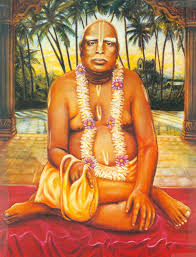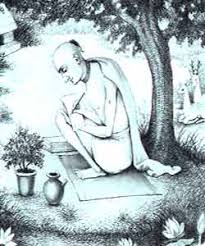
Aug 5 1976 French farm-New Mayapura
Bhūgarbha: He doesn’t think he’ll be able to follow the life of the Vaiṣṇavas, because our life is too difficult.
Prabhupāda: That attitude will help him. That humbleness, that “I cannot follow,” that will help.
Bhūgarbha: He says he has a tendency more of a jñānī, and his training has been according to Śaṅkarite and also Buddhist lines. But still he appreciates very much bhakti, and he is very happy to meet the devotees, and at the same time he’s very depressed to meet all these intellectuals who know so many things but cannot understand anything.
Prabhupāda: Without becoming jñānī, nobody can become bhakta. Without knowledge, if one has become bhakta, he’s sentimentalist. It is stated in the Bhagavad-gītā, find out this verse. Samaḥ sarveṣu bhūteṣu mad-bhaktiṁ labhate parām [Bg. 18.54]. brahma-bhūtaḥ prasannātmā na śocati na kāṅkṣati samaḥ sarveṣu bhūteṣu mad-bhaktiṁ labhate parām
(French translation read) So without becoming fully in knowledge, nobody can become devotee.
Bhūgarbha: He asks, What about the opposite, people becoming devotees without knowing anything? He asking…
Prabhupāda: No, devotee cannot be without knowing anything. A devotee means, a devotee means he knows everything. Kasmin tu bhagavo vijñāte sarvam idaṁ vijñātaṁ bhavati. This is Vedic injunction. One who knows the Absolute, he knows everything.
Yogeśvara: Śrīla Prabhupāda? That verse, does that mean that one who is neophyte…
Prabhupāda: Neophyte is neophyte. Why do you bring him to become a devotee? A devotee is different. A “one plus one equal to two,” he’s not mathematician. He’s learning. There is hope one day he’ll be a big mathematician. There are three stages, kaniṣṭha-adhikārī, madhyama-adhikārī, uttama-adhikārī. So when you speak of devotee, that is this uttama-adhikārī. So he knows everything. Rather, the so-called jñānī, he does not know. Because he does not know Kṛṣṇa. The so-called jñānī, he does not know what is Personality of Godhead. He’s impersonalist. Therefore he is still unaware of the Absolute Truth. Therefore he’s not jñānī. His jñāna, his knowledge, is lacking. Therefore in the Bhagavad-gītā it is said, bahūnāṁ janmanām ante jñānavān māṁ prapadyate vāsudevaḥ sarvam iti sa mahātmā sudurlabhaḥ [Bg. 7.19]
If one jñānī is impersonalist, he’s not jñānī. He is still unaware of the Absolute Truth. He does not know. Therefore it will take many, many births to come to the understanding of the Personality of Godhead. Therefore he’s not jñānī, he’s claiming to be jñānī. Such jñānī will take many hundreds of births to come to the position of real jñānī. Find out this bahūnāṁ janmanām ante [Bg. 7.19]. So-called jñānī, after many, many births, when he understands Kṛṣṇa and surrenders to Him, then he’s jñānī. Sa mahātmā sudurlabhaḥ. That kind of jñānī is very, very rare. The impersonalist means ajñānī. Yes. Because he does not know Kṛṣṇa, the person. There is another verse in the Śrīmad-Bhāgavatam: āruhya kṛcchreṇa paraṁ padaṁ tataḥ patanty adhaḥ [SB 10.2.32]. Āruhya kṛcchreṇa, by the jñāna process, is undergoing austerities and penances, one comes to the platform of paraṁ padam, monism, or platform of oneness. But because he has no shelter, he patanty adhaḥ, again comes to the material. Just like so many sannyāsīs in India, they are very learned, they have come to the platform of Brahman realization, but after some time they come to the material field for political work, for social work. They give up this world, brahma satyaṁ jagan mithyā. If jagat is mithyā, is false, why does he come for social work? Just like these people going to the moon planet, but because they do not get any shelter, they take some sand and come back again. So what is the use of going there and spending so much money and come back with little sand, and satisfied, “Now we have studied”? Because they have no shelter. So the jñānīs, they have no shelter. Yes. They may go very high in the sky, but because they have no shelter they come back again. Punar muṣaka bhava, again become a mouse. So that is not jñānī, that is ajñānī. Jñānī is described here, mad-bhaktiṁ labhate parām [Bg. 18.54]. Brahma-bhūta [SB 4.30.20] is jñānī, ahaṁ brahmāsmi. Brahma-bhūtaḥ prasannātmā, “I have nothing to do with material world.” Brahma-bhūtaḥ prasannātmā na śocati na kāṅkṣati [Bg. 18.54], there is no lamentation, there is no hankering. When he has attained that stage, brahma-bhūta stage, reality, then he is entrance in the bhakti. Otherwise a neophyte.
Some Conclusions– Prabhupada says above…”Without becoming jñānī, nobody can become bhakta. Without knowledge, if one has become bhakta, he’s sentimentalist.”
Today as in the past, so many of our devotees have a sentimental understanding of the philosophy. Otherwise why was Prabhupada admonishing his disciples so many times for not having the answers to his questions? He would ask-do you read the books? Why not? Are you only book sellers?
I have personally witnessed this again and again with devotees who say they have no or little attraction to reading the books, and yet these are ones most inclined to become sahajiyas later on. Without knowledge or jnana as Prabhupada mentions above one has no entrance to Bhakti and remains neophyte and will remain in this material world..
He explains it all very clearly above-the difference between karmis, jnanis, and yogis and Bhaktas…..Without becoming jñānī, nobody can become bhakta. Without knowledge, if one has become bhakta, he’s sentimentalist.
Hare Krsna
damaghosa das
ps-see the next article I will send out where Prabhupada is toying with his disciples over some questions he poses and none of them can answer him correctly.
Next article title–That is the point. If you love God, then why you disobey His order?–SP




